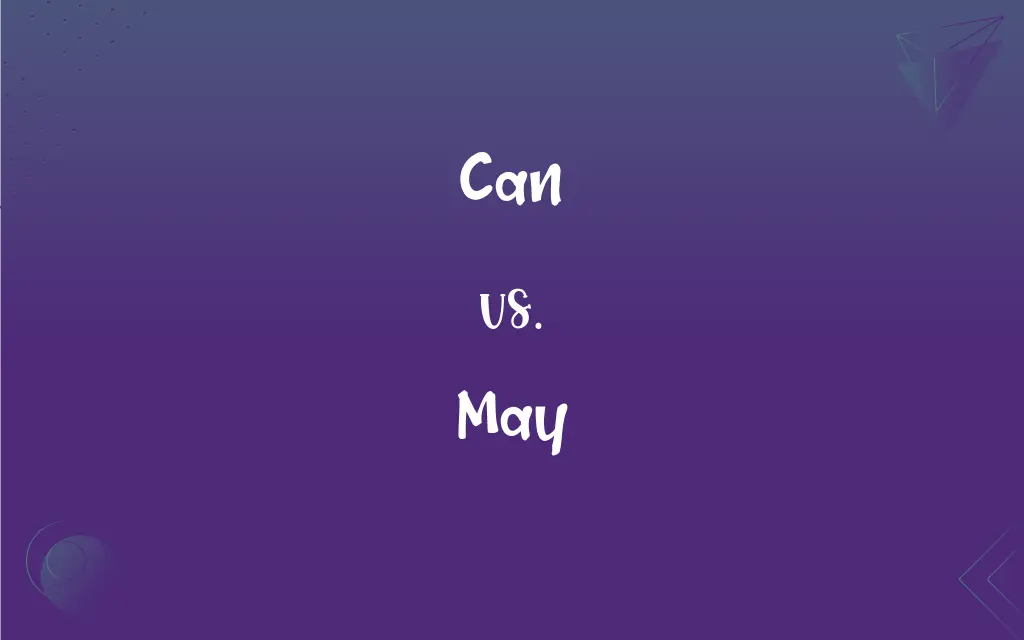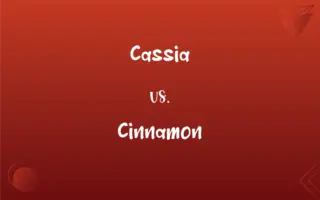Can vs. May: What's the Difference?
Edited by Janet White || By Harlon Moss || Updated on October 25, 2023
"Can" denotes ability or possibility, while "may" indicates permission or likelihood.

Key Differences
"Can" and "may" are both modal verbs in English, but they serve different purposes. While "can" often implies a person's capability or potential to do something, "may" generally suggests permission or a possibility that something will happen.
When someone uses "can," they are usually referring to a skill or ability. For instance, saying "I can swim" means the speaker possesses the skill to swim. In contrast, "may" would be inappropriate in this context as it implies permission rather than ability.
In the realm of asking for permission, "may" is traditionally seen as more formal and polite. For instance, "May I go to the restroom?" is a more courteous way to request permission than using "can" in the same context.
However, in modern American English, the distinction between "can" and "may" has become blurred, especially in informal settings. It's not uncommon to hear someone ask, "Can I have a cookie?" instead of the more traditional "May I have a cookie?"
Both "can" and "may" also have other meanings beyond ability and permission. For example, "can" can mean to preserve food in a sealed container, and "may" can be used to express a wish or hope.
ADVERTISEMENT
Comparison Chart
Primary Use
Denotes ability or possibility
Indicates permission or likelihood
Example of Use
"I can swim"
"You may enter"
Formality
Generally less formal
More formal and polite
Common Misconception
Often misused to ask for permission
Sometimes considered too formal in casual settings
Additional Meanings
To preserve food in a sealed container
To express a wish or hope
ADVERTISEMENT
Can and May Definitions
Can
"Can" suggests the possibility of something occurring.
It can rain later today.
May
"May" is used to request or grant permission.
May I join you for dinner?
Can
"Can" is used to ask for or grant permission (informally).
Can I borrow your book?
May
"May" refers to the fifth month of the year.
My birthday is in May.
Can
"Can" refers to a cylindrical metal container.
She opened a can of tuna.
May
"May" denotes a possibility or likelihood.
It may snow tomorrow.
Can
"Can" indicates the ability or capacity to do something.
She can play the piano beautifully.
May
"May" is used to express wishes or hopes.
May your dreams come true.
Can
"Can" means to preserve food by sealing it in a container.
My grandmother can tomatoes every summer.
May
"May" suggests a certain condition or requirement.
You may leave if you finish your work.
Can
A usually cylindrical metal container.
May
A hawthorn or its blossoms.
FAQs
When should I use "can" versus "may"?
Use "can" for ability or possibility and "may" for permission or likelihood.
Is it incorrect to say "Can I go to the store?"
While "May I" is more traditional for permission, "Can I" is widely accepted in informal settings.
What's the past tense of "can"?
The past tense of "can" is "could."
What's the past tense of "may"?
The past tense of "may" is "might."
Is "Can I have a cookie?" grammatically correct?
In modern usage, it's acceptable, though "May I" is more traditionally polite.
How do "can" and "may" function in questions?
They often precede the subject, as in "Can you?" or "May I?"
Are "can" and "may" interchangeable?
Not always. While sometimes used interchangeably, especially informally, they have distinct meanings.
Which is more formal: "can" or "may"?
"May" is generally more formal than "can."
Can "can" denote a possibility?
Yes, as in "Anything can happen."
Can "may" be used to express wishes?
Yes, for example, "May you have a prosperous year."
Do "can" and "may" have negative forms?
Yes, "cannot" or "can't" for "can" and "may not" for "may."
Can "can" refer to a container?
Yes, "can" can mean a cylindrical metal container.
Are there other meanings to the word "may" besides asking for permission or indicating possibility?
Yes, "may" can also be used to express a wish or hope, as in "May you live long."
Can "can" be used to indicate a physical ability?
Yes, for instance, "She can lift 50 pounds."
What are the negative contractions for "can" and "may"?
"Can't" for "cannot" and "mayn't" for "may not," though "mayn't" is rare.
In which scenarios would "may" be more appropriate than "can"?
When asking for formal permission, expressing uncertainty, or expressing a wish.
How do "can" and "may" function in answers?
They can be used as auxiliary verbs, e.g., "Yes, I can" or "No, you may not."
Can "may" refer to a month?
Yes, "may" refers to the fifth month of the year.
Is "May you help me?" a correct usage of "may"?
It's grammatically correct but less common. "Can you help me?" or "Could you help me?" are more typical.
Is it considered rude to use "can" when asking for permission?
In informal settings, "can" is often acceptable. However, in formal or polite contexts, "may" is preferred.
What is the primary use of "may"?
"May" is primarily used to indicate permission or likelihood.
Why do some people correct "Can I" to "May I"?
Traditionally, "May I" is seen as the proper way to request permission, but both forms are common today.
About Author
Written by
Harlon MossHarlon is a seasoned quality moderator and accomplished content writer for Difference Wiki. An alumnus of the prestigious University of California, he earned his degree in Computer Science. Leveraging his academic background, Harlon brings a meticulous and informed perspective to his work, ensuring content accuracy and excellence.
Edited by
Janet WhiteJanet White has been an esteemed writer and blogger for Difference Wiki. Holding a Master's degree in Science and Medical Journalism from the prestigious Boston University, she has consistently demonstrated her expertise and passion for her field. When she's not immersed in her work, Janet relishes her time exercising, delving into a good book, and cherishing moments with friends and family.































































